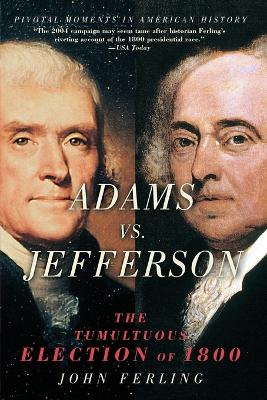Pivotal Moments in American History (Oxford)
1 total work
It was a contest of titans: John Adams and Thomas Jefferson, two heroes of the Revolutionary era, once intimate friends, now icy antagonists locked in a fierce battle for the future of the United States. The election of 1800 was a thunderous clash of a campaign that climaxed in a deadlock in the Electoral College and led to a crisis in which the young republic teetered on the edge of collapse.
Adams vs. Jefferson is a gripping account of a true turning point in American history, a dramatic struggle between two parties with profoundly different visions of how the nation should be governed. Adams led the Federalists, conservatives who favored a strong central government, and Jefferson led the Republicans, egalitarians who felt the Federalists had betrayed the Revolution of 1776 and were backsliding toward monarchy. The campaign itself was a barroom brawl every bit as
ruthless as any modern contest, with mud-slinging-Federalists called Jefferson "a howling atheist"-scare tactics, and backstabbing. The low point came when Alexander Hamilton printed a devastating attack on Adams, the head of his own party, in "fifty-four pages of unremitting vilification." The election ended
in a stalemate in the Electoral College that dragged on for days and nights and through dozens of ballots. Tensions ran so high that the Republicans threatened civil war if the Federalists denied Jefferson the presidency. Finally a secret deal that changed a single vote gave Jefferson the White House. A devastated Adams left Washington before dawn on Inauguration Day, too embittered even to shake his rival's hand.
Jefferson's election, John Ferling concludes, consummated the American Revolution, assuring the democratization of the United States and its true separation from Britain. With magisterial command, Ferling brings to life both the outsize personalities and the hotly contested political questions at stake. He shows not just why this moment was a milestone in U.S. history, but how strongly the issues-and the passions-of 1800 resonate with our own time.
Adams vs. Jefferson is a gripping account of a true turning point in American history, a dramatic struggle between two parties with profoundly different visions of how the nation should be governed. Adams led the Federalists, conservatives who favored a strong central government, and Jefferson led the Republicans, egalitarians who felt the Federalists had betrayed the Revolution of 1776 and were backsliding toward monarchy. The campaign itself was a barroom brawl every bit as
ruthless as any modern contest, with mud-slinging-Federalists called Jefferson "a howling atheist"-scare tactics, and backstabbing. The low point came when Alexander Hamilton printed a devastating attack on Adams, the head of his own party, in "fifty-four pages of unremitting vilification." The election ended
in a stalemate in the Electoral College that dragged on for days and nights and through dozens of ballots. Tensions ran so high that the Republicans threatened civil war if the Federalists denied Jefferson the presidency. Finally a secret deal that changed a single vote gave Jefferson the White House. A devastated Adams left Washington before dawn on Inauguration Day, too embittered even to shake his rival's hand.
Jefferson's election, John Ferling concludes, consummated the American Revolution, assuring the democratization of the United States and its true separation from Britain. With magisterial command, Ferling brings to life both the outsize personalities and the hotly contested political questions at stake. He shows not just why this moment was a milestone in U.S. history, but how strongly the issues-and the passions-of 1800 resonate with our own time.
